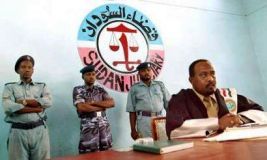Sudan insists on own legal system, will not confront UN on Darfur
KHARTOUM, Sudan, June 9, 2005 (PANA) — The Sudanese government said it would handle investigations into alleged atrocities in the western region of Darfur on its own, and would not confront the UN Security Council on the International Criminal Court (ICC) enquiry.

|
|
A special judge, sits in court in Nyala Sept 30, 2004 to try six Sudanese men accused of belonging to the Janjaweed, who killed 24 people in the southern Darfur region in Oct 2003.(Reuters). |
The Hague-based ICC announced Monday it had formally launched a
comprehensive investigation into suspected war crimes in the
Darfur region, where tens of thousands have been reported killed
and two million displaced during more than two years of rebellion.
Government-allied Arab militias, the Janjaweed, have been accused
of a widespread rape, killing and pillaging in the region.
The Khartoum government had repeatedly said it would not send any
Sudanese citizen to a court outside its territory.
Following the ICC statement on Monday, the local press has quoted
Sudanese Foreign Minister Mustafa Osman Ismail as saying: “For us
the (ICC) statement and the steps which are now going on are still
preliminary. They are procedural and technical steps.”
“We will study it carefully and it is not part of our agenda to confront
the Security Council. Our understanding is still that the Rome statute
will allow space that the government of Sudan could do its job within the
framework of the Security Council,” the Minister said. “Our legal adviser
also said that the resolutions could be executed within the understanding
of the Sudan legal system.”
Accusing the Sudan government of not doing enough to bring those
responsible for the alleged atrocities to justice, the Security
Council instructed the ICC to open an investigation.
In April, UN Secretary General Kofi Annan gave the ICC a sealed list
of some 51 people believed to include top Sudanese government and
army officials, militia leaders and rebel and foreign commanders
believed linked with war crimes in Darfur.
“We have not been asked to handover anyone. Our position is that no one
should be exempt, anyone who commits crimes in Darfur should be brought
to justice and should have to have the necessary punishment,” Ismail
said.
“We are on our way to establish a special court, with special procedures,
inside Sudan, to do such things.”
The Foreign Ministry in a statement in Khartoum, described the ICC’s
investigation into alleged human rights abuses and atrocities in Darfur
as “a step at a wrong time and in a wrong context.”
“Such a declaration sends a wrong signal to the (Darfur) rebels with
regard
to the negotiations… It equally creates a negative climate for the
negotiations,” the State Minister at Foreign Affairs, Najeeb Al-Khair
Abdel Wahab, was quoted by the official Sudan news agency, SUNA as saying
Tuesday.
African Union-brokered peace talks are due to resume this month in
the Nigerian capital Abuja, between the Khartoum government and the
Darfur rebel Sudan Liberation Movement (SLM) and the Justice and
Equality Movement (JEM).
